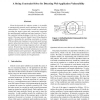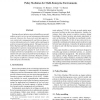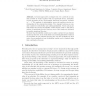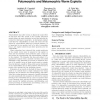46 search results - page 7 / 10 » Formal analysis of attacks for e-voting system |
SEKE
2010
Springer
13 years 6 months ago
2010
Springer
Given the bytecode of a software system, is it possible to automatically generate attack signatures that reveal its vulnerabilities? A natural solution would be symbolically execu...
ACSAC
2000
IEEE
14 years 1 days ago
2000
IEEE
Existing software infrastructures and middleware provide uniform security services across heterogeneous information networks. However, few, if any, tools exist that support access...
FROCOS
2007
Springer
14 years 1 months ago
2007
Springer
Abstract. In formal approaches, messages sent over a network are usually modeled by terms together with an equational theory, axiomatizing the properties of the cryptographic funct...
CCS
2005
ACM
14 years 1 months ago
2005
ACM
Vulnerabilities that allow worms to hijack the control flow of each host that they spread to are typically discovered months before the worm outbreak, but are also typically disc...
SP
2008
IEEE
13 years 6 months ago
2008
IEEE
e an abstraction of zero-knowledge protocols that is le to a fully mechanized analysis. The abstraction is formalized within the applied pi-calculus using a novel equational theor...




